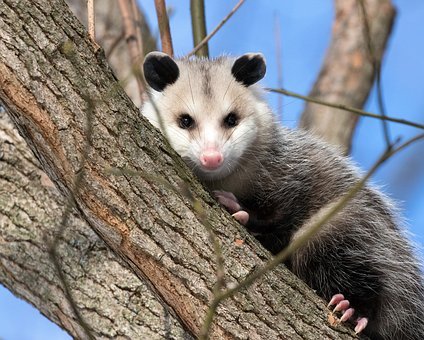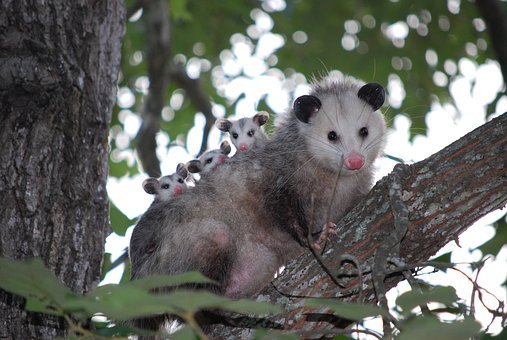Cute fluffy marsupial, or pesky vermin?
Ah, the joys of wildlife! I’ve written before about spiders and snakes, about birds and insects and koalas. Sharing a garden with wildlife invariably involves compromise – parrots eating not half your fruit but, more annoyingly, half of every fruit on the tree; koalas squashing beds of annuals, kangaroos munching special plants. So how to enjoy those possums in your garden?
Possums – both ring-tailed and brush-tailed – are amongst the native animals that have adapted best to co-existence with urban and suburban humans. They find small gaps (9cm!) and take up residence in our roofs, and happily forsake native species for exotic plants, choosing with unerring precision the most precious ones. Their busy munching will beat us to apples, fruit, and even blossoms. They have loud arguments or games of chasey at midnight on, or in, our roof. So why not just get rid of them?

Relocation and Culling
Some people hire a possum trap and "relocate" the animals to a park or reserve some distance away. This is not a kind option because, like koalas, about 90% of them will be unable to make a niche within an existing population and will be dead within one week. And with an empty niche in your garden or roof space, a new possum will move in from next door.
In areas where possums have been introduced and are not endemic such as island habitats, or places like New Zealand, possums constitute a feral animal no different to introduced rabbits or foxes, and I support humane culling (by a clean shot, by trapping and lethal injection, or - in New Zealand, where there are 70 million possums destroying the ecosystem - by baiting,) as the most appropriate option. Please don’t drown any animal, even a pest – it’s a horrible death for any creature.
But in most areas of Australia, possums are endemic – they are native animals that belong there, and it’s illegal to kill or relocate them without a permit (check your local council regulations and State Government Acts that cover wildlife). So what to do if you have a "Possum Problem"?
Is there a Problem?
First, define whether there really IS a problem, or whether a change in your own perspective will solve it for you. Perhaps there isn’t a problem if the possum is not eating every fruit off the tree, or biting every bud off the bush. Ringtailed possums have a more specific diet than brushtails, and are unlikely to raze your vegetable or flower beds. Seriously consider whether you can live with what your possum is taking. If you can: problem solved.
Every year, I await with bated breath the flowering of two large clumps of herbaceous paeonies in my back garden. The flower spikes arise, the buds swell, I glimpse the petal edges… then - poof! - gone, all the buds neatly nipped off and consumed in a single night. Grrr! But hey, the possums leave alone my camellias, hydrangeas and currants. They eat some of my apples, but not all of them.

I can live with that.
My daughter in suburban Adelaide, conversely, has to contend with "Rolf". Rolf is a huge old male brushtail who is strangely non-nocturnal. The neighbours feed and pat him. He treats my daughter’s cat with complete disdain. Like a pet dog, he emerges from the shed in broad daylight and saunters around the garden as if he owns it, nibbling on whatever takes his fancy. And a LOT takes his fancy. Crabapple blossoms, nectarines (every fruit on the dwarf tree), almonds, seedlings, and vegetables.
Every vegetable. There IS a problem.
Possums living in roof spaces are also a problem, not necessarily in the short term but in the long-term, when their urine will stain ceilings, cause bad smells and be a general health concern. It’s also difficult to believe that such relatively small animals can sound like, well, elephants, when they’re cavorting above your head at 1am!
Out of the Roof and Into the Garden
Most councils have traps for hire, but there’s no point taking the possum out of the roof without sealing all the possible entry points. Not long after we built our house, a brushtail took up residence in our ceiling space, so we hired a professional pest controller to seal up all the gaps, then trap the possum and put it outside. Seals must be strong and well-made, because possums are strong. We’ve not had a possum in our roof since. The best way to find openings in your ceiling space through which possums are entering is from inside the space itself, rather than hunting from the outside.
When catching your possum, bait traps with a mix of oatmeal, peanut butter and honey mixed to a playdough-like consistency, and stuck to a quarter piece of apple. Irresistible! However, take care: brushtails have sharp teeth and claws, strong jaws and are incredibly powerful and flexible.
Napthalene flakes in ceiling spaces reportedly deter possums, but are unlikely to remove ones that have already taken up residence. Camphor is an alternative. Erect a nest box under the eaves or in a tree for your evicted possum.
Netting
Buy disposable or reusable, cheap or expensive netting, in large or small pieces to cover individual fruit trees, grapes etc. When my daughter built her vegetable garden last spring, we erected a frame of long garden stakes with horizontal slats across the top, and draped the whole thing in lightweight black mesh, closed with clothes pegs. It’s not strong and I was worried Rolf would fall or climb the mesh and become hopelessly entangled, but he has avoided it completely and it has been a great success. Perhaps we inadvertently hit on a winner with out wobbly construction, because possums loathe unsteady footing (most articles recommend that both construction and netting be strong and tight). For low-growing vegies, individual beds can be covered with an arch of weldmesh, draped in netting. Chicken wire attached to a firm frame also works.
Other physical deterrents
For upright trees with long trunks whose canopies are well away from adjoining trees, roofs or powerlines, a 60cm cylinder of smooth metal or hard plastic around the trunk, about half a metre up, will prevent possums from climbing up.
On horizontal structures, such as the frame of a pergola, a loose cylinder of wire netting or mesh that rotates freely around the support will deter them from crossing.
Fences with floppy tops can exclude possums from a garden if there is no alternative way to scale the barrier. Desperate gardeners have even strung up solar-powered electric wires (as opposed to fences)! Ultra-sonic devices are another expensive (and unproven) option.
Repellents
There is a huge range of suggestions, accumulated over the decades by gardeners who have despaired as their roses and vegies are munched away. Repellents are often strong-smelling, fish- or animal-based substances and all sprays need to be reapplied more or less often, especially after rain.
One university study indicated that household bleach, Keep Off®, Camphor, Naphthalene and Scat® have some effectiveness… but not when the possum is really hungry, which suggests to me that feeding your possum from a regular station or platform may also help save your garden! The other substances tested, including Tabasco, fish sauce, quassia chips, blood andbone, mustard, and several commercial repellents, had no effect, but the study’s authors suggest that different possums may be deterred by different substances, so I’ve included them in my list of possibilities. Anecdotal evidence of effectiveness varies widely, so it’s a matter of trying, and seeing what works for you. Sometimes, the cure seems worse than the disease: suggestions I came across included covering fruit with camphor-impregnated Vaseline, smearing fences and plants with heavy grease, or buying a yappy small dog to bark in the garden all night!
Check all sprays on a small area of the plant first, as some preparations may burn leaves or fruit, especially in hot weather. Wetting agents can improve effectiveness of some preparations.
Sprays include
- Strong infusion of lapsang souchong tea, cooled.
- Egg powder, mixed 200g/L, but not in very hot, dry weather
- Mutton fat and kero (lower stem and branches only, not leaves)
- Quassia bark chips 300G/L, boiled 5mins (spray on ground and trunk, not leaves)
- 15ML neem oil/L water
- Liquified seaweed or seaweed extract
- Mothballs (naphthalene) hung amongst fruit in trees
- Soft toys placed in trees
- Infusions of chili, horseradish, mustard, or strong-smelling herbs such as garlic and rosemary
- Thai fish sauce (1 TBSPN/L)
- Charlie Carp fertiliser
- Commercial preparations such as D-Ter, Scat, Poss-Off, Keep-Off etc.
- Blood and Bone sprinkled around base of plants
- Household bleach
- Hospital-grade disinfectant
- Camphor, crumbled into vaseline and smeared onto stems
- Citronella oil, diluted
- I haven’t seen it suggested anywhere for possums, but I know that one small, dry, odourless (to us) snake poo (collected from my daughter’s pet python) in the corner of a kitchen cupboard works well against mice. Perhaps it might work against possums, either scattered in a roof cavity, placed around plants, or diluted and sprayed onto branches? A commercial preparation, ‘Shake-Away’, made of (ahem) dried fox urine, claims to be effective.
Possums are a part of our heritage and, as I’ve written before, we should consider ourselves lucky to share our gardens with wildlife – any wildlife – when the rate of extinctions is accelerating throughout the world.
Thanks for using eSteem!
Your post has been voted as a part of eSteem encouragement program. Keep up the good work! Install Android, iOS Mobile app or Windows, Mac, Linux Surfer app, if you haven't already!
Learn more: https://esteem.app
Join our discord: https://discord.gg/8eHupPq
You think possums are more a nuisance? I have heard tales of them being somewhat of a boon to the garden, most specifically in preventing bad bugs from spreading and removing slug and grubs. I believe they can also frighten territorial squirrels away, which sometimes dig up young and tender seedlings and bulbs.